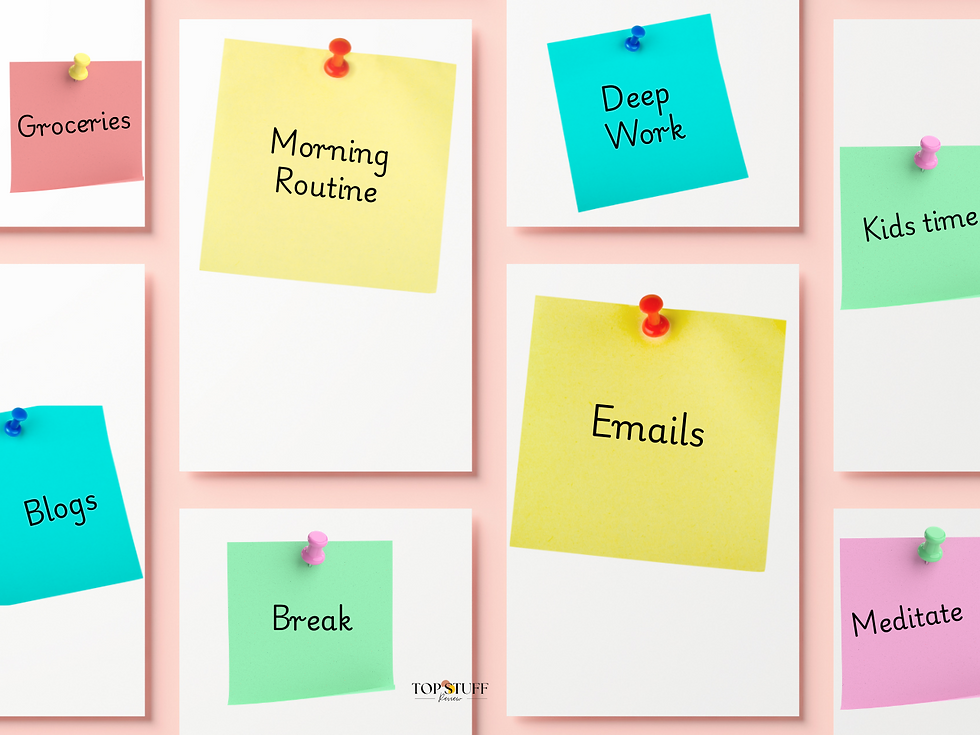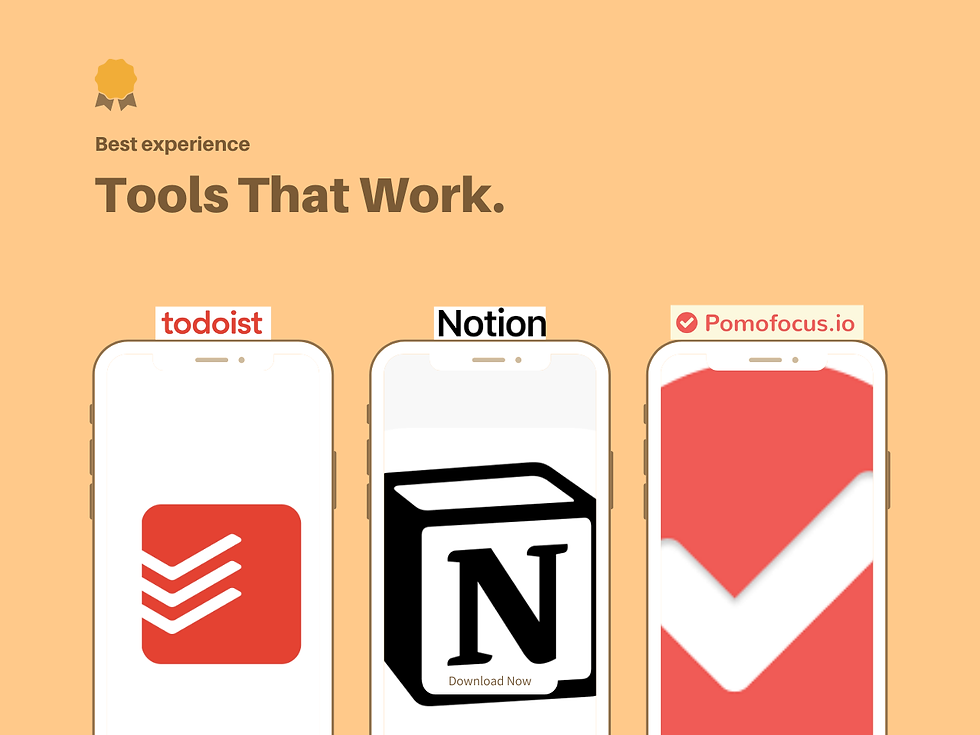How to Overcome Procrastination and Stay Focused
- Apr 16, 2025
- 5 min read
Updated: May 21, 2025

Hey there! If you’re reading this, chances are you’re like me—a recovering procrastinator. Whether you put off big tasks, scroll endlessly on your phone, or just find yourself daydreaming when you should be doing something productive, I totally get it. That was me for years.
In this blog post, I’ll walk you through what helped me shift gears from being constantly overwhelmed and unproductive to staying on track (most days). These aren’t just theories—I’ve lived through every tip I’m sharing here. Let’s dive into how to overcome procrastination and stay focused for good!
1.Understanding Procrastination: Why We Do It

Before we get into the practical stuff, it’s important to understand what procrastination actually is. It’s not just laziness. It’s a complex emotional response often rooted in fear, perfectionism, or lack of motivation.
When we delay doing something, our brains are usually trying to avoid discomfort. Maybe we fear failure, maybe we don’t know where to start, or maybe the task just feels too big. Recognizing this can help us be kinder to ourselves and break the cycle.
One of my friends, a freelance designer, once told me she’d spend hours “researching” on Pinterest before starting a new project. But when we dug deeper, it turned out she was afraid her work wouldn’t be good enough. Sound familiar?
2.My Personal Struggle with Procrastination

There were days I would sit at my laptop, fully intending to write or work on my blog, and end up cleaning out my inbox or reorganizing my desk instead. Sound familiar? The worst part was the guilt. I’d beat myself up for not being productive, which made it even harder to get started the next day.
Eventually, I had to face the fact that my approach wasn’t working. I needed structure, tools, and most importantly, mindset shifts. Here’s what worked for me...
3.Practical Strategies to Overcome Procrastination
a) Break Tasks into Bite-Sized Chunks
When I used to look at a huge task like "write a blog post" or "set up a new landing page," I’d immediately freeze. But breaking it down into smaller tasks—like "write the introduction" or "choose 3 blog images"—suddenly made it manageable.
What really helped was switching to a digital planner notebook that lets me jot down tasks and check them off with ease. I use it like a brain-dump tool in the mornings, and then just pick one tiny task to start with. (You can check out this popular digital notebook on Amazon — it’s super handy for organizing bite-sized goals.)
A cousin of mine, who’s a teacher, swears by this too. She breaks down lesson planning into “10-minute tasks,” which helps her stay ahead without the panic.
b) Use the 5-Minute Rule
This rule changed my life. I’d tell myself, "Just do it for 5 minutes." That tiny commitment often tricked my brain into getting started, and before I knew it, I was deep into the task. Starting is the hardest part.
You can even use a visual countdown timer like this digital cube timer for productivity — just flip it to the desired time and let it nudge you into action.
My sister uses this trick to get her kids started on homework. She tells them they only need to do five minutes—and most of the time, they end up finishing the whole assignment.

c) Create a Distraction-Free Environment
Let’s be real—our phones are productivity killers. I started putting mine in another room while working. I also started using tools that keep me focused—like a simple phone lock box or a screen time timer device—to physically limit distractions. Life. Saver.
For an affordable pair of noise-cancelling headphones, I personally recommend these Anker Soundcore Q20 headphones available on Amazon. They’re comfortable, reliable, and perfect when you need deep focus.
A friend of mine, who works remotely with three toddlers at home, wears headphones just to signal “do not disturb.” Even if she’s not listening to anything!

d) Time Blocking and Scheduling
Time blocking was a game-changer for me. I now plan my day in chunks dedicated to specific tasks. No multitasking. It helps reduce decision fatigue and gives my day structure.
I use a simple, minimalist planner like this daily productivity journal to visually block my day and keep track of priorities without the clutter.
I got this idea from an ex-colleague who was juggling multiple clients and struggling to keep up. She now swears by 90-minute focused blocks followed by 15-minute breaks.

e) Use Productivity Tools That Actually Help
Some tools overwhelmed me more than they helped. The ones that stuck were:
Notion: For notes and planning
Pomofocus.io: A simple Pomodoro timer
These tools helped me create systems instead of depending on willpower.
My brother uses Notion to track his fitness, groceries, and even his Netflix watchlist. Seeing his progress in one place keeps him motivated.

f) Celebrate Small Wins
This was a mindset shift. I stopped waiting for huge milestones to feel accomplished. Crossing one thing off my list or writing just 300 words was worth a little celebration. It built momentum.
Sometimes I’d reward myself with a walk, a coffee, or watching a quick episode of something fun.
How I Stay Focused Even on My Worst Days
I still have off days. When I do, I:
Revisit my "why"
Do the easiest task first
Use music or ambient noise for focus
Take short breaks often

A friend in customer service once told me that on her toughest days, she starts with the most fun or easy part of her job—like replying to friendly clients. It boosts her mood enough to tackle the tougher stuff.
4.Bonus: Healthy Habits That Support Focus and Discipline

Let’s talk lifestyle. Focus isn’t just a mental game—it’s physical too.
Sleep
I started prioritizing 7–8 hours of sleep. Everything is harder when you’re tired.
Hydration
It sounds basic, but drinking enough water boosted my focus. I use this motivational water bottle to stay on track.
Morning Routines
Waking up and jumping straight into work didn’t work for me. Now, I spend the first 30 minutes reading, stretching, or journaling. It sets the tone.
My aunt does morning pages—a stream-of-consciousness journaling trick. She swears it helps her clear the mental clutter.
Nutrition
I noticed a big change in my ability to concentrate when I started eating real meals instead of snacking on junk.
For quick healthy meal prep, I love using the Magic Bullet Blender. It makes smoothies in 5 minutes.
5.The Role of Accountability and Community

One thing that really helped me was sharing my goals with a friend. Just knowing someone else was cheering me on (or waiting for that blog post I said I’d finish) pushed me to follow through.
I’m in a small WhatsApp group with two other creators. We drop in daily to share what we’re working on. No judgment, just encouragement.
If you're not into groups, even using a public habit tracker like Habitica or a shared Google Sheet with a buddy can keep you going.
6.Replacing Perfectionism with Progress

Final Thoughts: It’s a Journey, Not a Destination
Overcoming procrastination and staying focused isn’t a one-time fix. It’s a journey. Some days you’ll crush it, and other days it’ll feel like pulling teeth. That’s okay. Progress over perfection.
I hope my story and these tips help you move the needle forward, even just a little. You’ve got this! If you've found a method that works for you, I’d love to hear about it—drop it in the comments or shoot me a message. Let’s keep learning from each other!
💡 Found this helpful? Sharing is caring! Pin it to your favorite board or share it with someone who might love it too.
You May Also Like:
✨ More for You: Explore other posts our readers love!













Comments